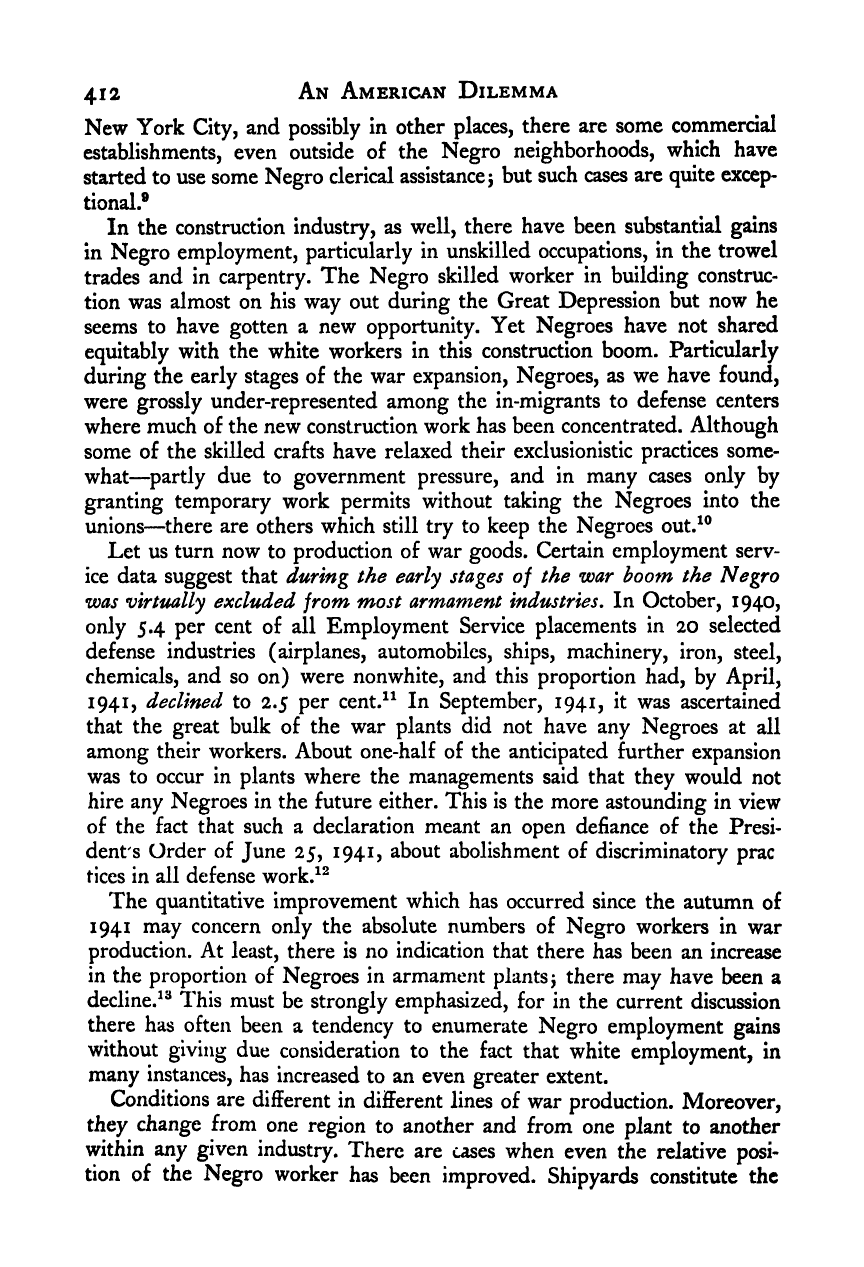Note: Gunnar Myrdal died in 1987, less than 70 years ago. Therefore, this work is protected by copyright, restricting your legal rights to reproduce it. However, you are welcome to view it on screen, as you do now. Read more about copyright.
Full resolution (TIFF) - On this page / på denna sida - IV. Economics - 19. The War Boom—and Thereafter - 2. A Closer View

<< prev. page << föreg. sida << >> nästa sida >> next page >>
Below is the raw OCR text
from the above scanned image.
Do you see an error? Proofread the page now!
Här nedan syns maskintolkade texten från faksimilbilden ovan.
Ser du något fel? Korrekturläs sidan nu!
This page has never been proofread. / Denna sida har aldrig korrekturlästs.
412 An American Dilemma
New York City, and possibly in other places, there are some commercial
establishments, even outside of the Negro neighborhoods, which have
started to use some Negro clerical assistance 5
but such cases are quite excep-
tional.®
In the construction industry, as well, there have been substantial gains
in Negro employment, particularly in unskilled occupations, in the trowel
trades and in carpentry. The Negro skilled worker in building construc-
tion was almost on his way out during the Great Depression but now he
seems to have gotten a new opportunity. Yet Negroes have not shared
equitably with the white workers in this construction boom. Particularly
during the early stages of the war expansion, Negroes, as we have found,
were grossly under-represented among the in-migrants to defense centers
where much of the new construction work has been concentrated. Although
some of the skilled crafts have relaxed their exclusionistic practices some-
what—partly due to government pressure, and in many cases only by
granting temporary work permits without taking the Negroes into the
unions—there are others which still try to keep the Negroes out.^®
Let us turn now to production of war goods. Certain employment serv-
ice data suggest that during the early stages of the war boom the Negro
was virtually excluded from most armament industries. In October, 1940,
only 5.4 per cent of all Employment Service placements in 20 selected
defense industries (airplanes, automobiles, ships, machinery, iron, steel,
chemicals, and so on) were nonwhite, and this proportion had, by April,
1941, declined to 2.5 per cent.^^ In September, 1941, it was ascertained
that the great bulk of the war plants did not have any Negroes at all
among their workers. About one-half of the anticipated further expansion
was to occur in plants where the managements said that they would not
hire any Negroes in the future either. This is the more astounding in view
of the fact that such a declaration meant an open defiance of the Presi-
dent’s Order of June 25, 1941, about abolishment of discriminatory prac
tices in all defense work.^^
The quantitative improvement which has occurred since the autumn of
1941 may concern only the absolute numbers of Negro workers in war
production. At least, there is no indication that there has been an increase
in the proportion of Negroes in armament plants j
there may have been a
decline.^ ^ This must be strongly emphasized, for in the current discussion
there has often been a tendency to enumerate Negro employment gains
without giving due consideration to the fact that white employment, in
many instances, has increased to an even greater extent.
Conditions are different in different lines of war production. Moreover,
they change from one region to another and from one plant to another
within any given industry. There are cases when even the relative posi-
tion of the Negro worker has been improved. Shipyards constitute the
<< prev. page << föreg. sida << >> nästa sida >> next page >>